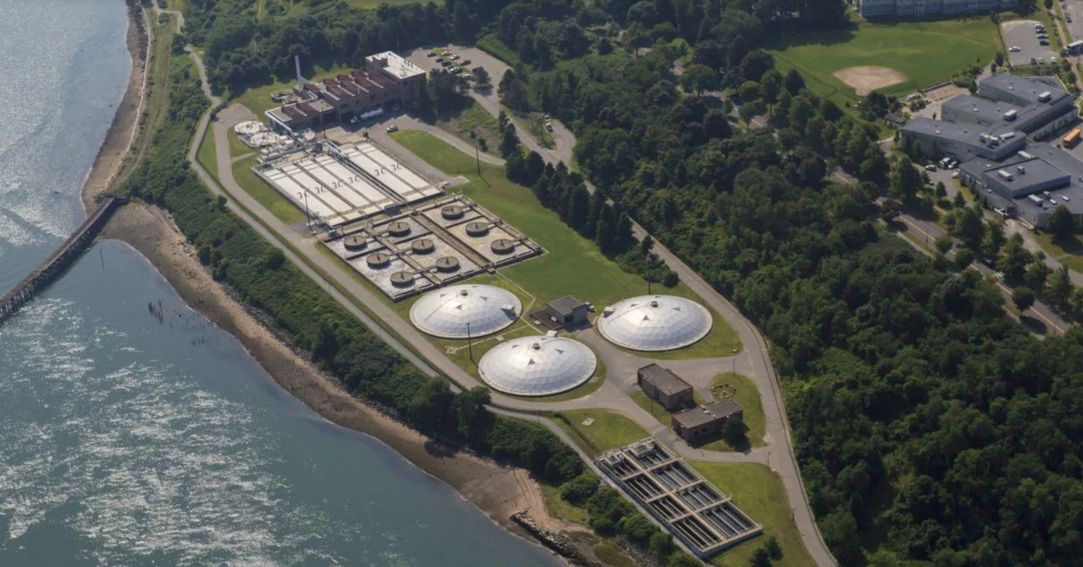Maine towns and wastewater plants say they’re reeling from the passage of a statewide ban on sludge fertilizer that aims to reduce harmful PFAS chemical contamination in soil and water.
Members of a range of groups that work with these so-called biosolids, from waste management companies to sewage plants and municipalities, met for a forum on the issue hosted by Maine’s E2Tech trade group last week.
These solids are left over from wastewater and have historically been treated for use as a nutrient-rich fertilizer instead of being landfilled or incinerated. But they can contain high levels of PFAS due to the chemicals’ ubiquity in human bodies and other wastewater sources.
The large group of “forever chemicals” known as PFAS, or per- and poly-fluoroalkyl substances, was pioneered by companies like 3M and DuPont for use in making a huge range of consumer and industrial products – from nonstick pans to makeup to furniture. These chemicals resist things like fire, grease, stains or water. They don’t break down in the environment and research has shown they may cause cancer or other serious health problems at very low levels.
At the virtual E2Tech forum, waste managers stressed that they are just recipients, not primary producers, of PFAS, and suggested they felt unfairly targeted by state lawmakers.
“This is not a wastewater treatment facility problem, it's a societal problem. Whatever products we use are going to wind up in the wastewater system,” environmental manager Jeff McBurnie of the landfill operator Casella said. “Ironically, products that expose us to contaminants of emerging concern – not just PFAS, but other things – have until 2030 (under another new state law) to find solutions or alternatives, while land application (of biosolids) which has a very limited breadth of impact is essentially terminated immediately. That same level of urgency has got to be applied to all potential sources of exposure to these compounds.”
The Maine Municipal Association supported the sludge ban in the name of protecting clean land and water for residents and business, said legislative analyst Neal Goldberg, though the group recognized that the ban could increase landfilling costs – towns officials are already feeling stressed by a “rush for contracts” to handle sludge that would have become fertilizer, he said.
“We looked at this and said, ‘This is the best thing for the health and safety of our residents right now,’” he said. “We do expect there to be some cost increases, which we are happy to swallow because of what we think the long-term benefit will be.”
Others said their industries will now be prioritizing research on safe and low-impact ways to dispose of sludge, which can destabilize landfills if it’s not handled properly. This could include pushing for more incinerators or studying new techniques to destroy PFAS-laden material.
In the short term, stakeholders said they expect the new ban to have big cost ramifications for waste handlers and potentially the public, especially in combination with another new law barring disposal of out-of-state waste at public landfills in Maine. Massachusetts is the top producer of sludge in the region and has historically exported much of that waste.
Executive director Janine Burke-Wells of the trade group North East Biosolids and Residuals Association, or NEBRA, said she thinks Maine and Massachusetts will both “have an issue finding homes for some of their materials.” Limited incinerator space and landfill capacity that the industry argues is dwindling in New England are also challenges.
“What happens in Maine is going to impact other states and vice versa,” she said. “I think this is a regional problem and we're talking about regional solutions.”
Scott Firman, the wastewater services director for the Portland Water District, said he wants the public to see sewage plants as part of that solution, not the problem.
“I think we've got to shift and recognize the policies that’ll support a transition from today to tomorrow. This problem wasn't created overnight – this has been going on for nearly 50 years,” Firman said. “I really think we've got to look at responsible parties, sustainable funding mechanisms, so that we're not asking today's wastewater ratepayers to fund a lot of this work.”
Sludge from the district’s East End and Westbrook wastewater plants has tested over state limits for one kind of PFAS. Neighboring New Hampshire has begun offering millions in grants for wastewater plants to upgrade treatment systems and prevent PFAS contamination, with a goal of adding to that funding after major multi-state lawsuits against PFAS makers are settled.



